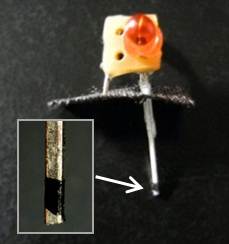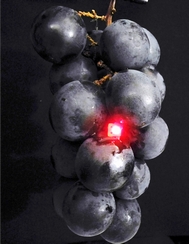December 14, 2012
New Self-Powered Biosensor Monitors Sugar without Battery
Keywords: Environmental Technology University / Research institute


Copyright Tohoku University
Professor Matsuhiko Nishizawa of the Graduate School of Engineering at Tohoku University and Senior Researcher Kenji Hata of the Nanotube Research Center at the National Institute of Advanced Industrial Science and Technology (AIST) have jointly developed a world's-first flexible enzyme electrode film that can be rolled and adhered to other objects and, using the enzyme electrode film, succeeded in generating electricity from aqueous glucose solution at the highest efficiency recorded worldwide. Part of their study was published online in the German scientific journal Advanced Energy Materials in August 2012.
Existing biosensors used in healthcare and merchandise control require large-size batteries that contain metals and solutions harmful to the environment and living organisms. The newly developed enzyme electrode film, which is made from organic materials, is a safe power generating system that directly uses the bio-energy contained in fruit juice or the like. It can also be used as a sensor since its electricity output is proportional to the amount of sugar contained in the fruit juice.
The research group is applying for a patent on its enzyme electrode film technology and recruiting business partners to help with commercializing it.
Related
"JFS Newsletter"
Related
"Popular Articles"
- New Nano-Bubble Technology May Help Dissolve Sludge and Improve Water Quality
- Japanese Firm Begins Development of Tidal Power Generation System
- Small Hydropower Generation System Developed for Use in Seawater, Weight Cut by Half
- Constructed Wetland Facility Established by Japanese University Purifies Livestock Farming Drainage
- Toyota CRDL Succeeds in World's First Artificial Photosynthesis Using only Water and CO2


